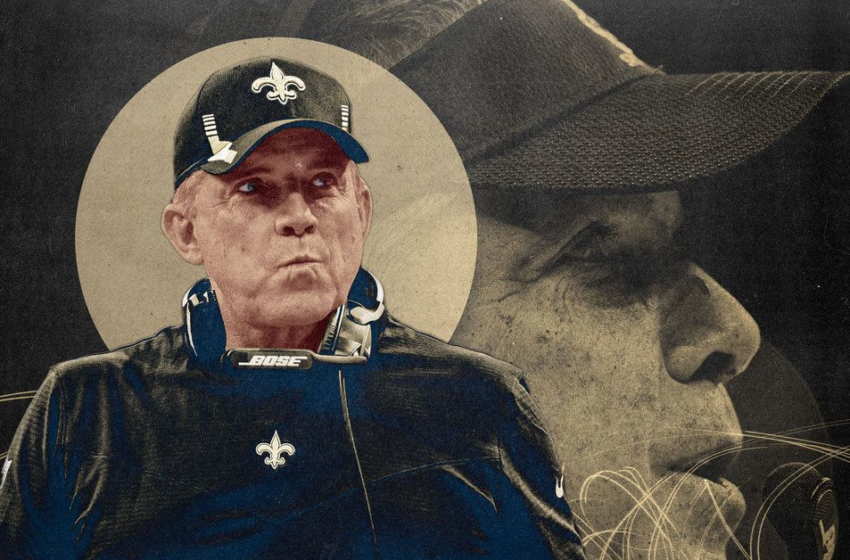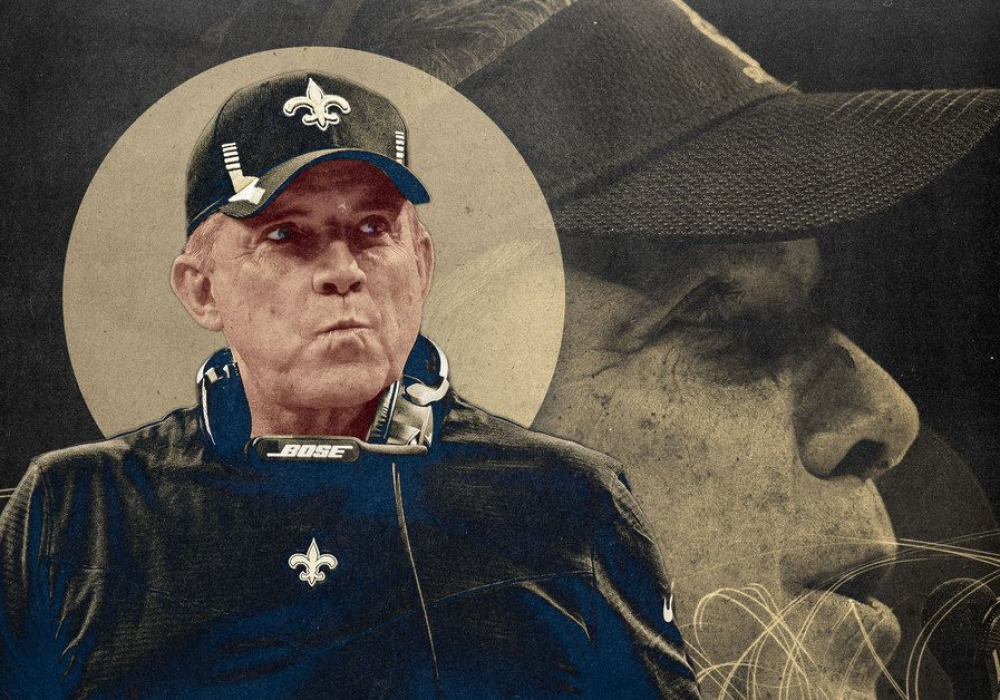Sean Payton does not, he said on Tuesday at his exit press conference, know what’s next, and that makes him feel good. I, however, do know what’s next for him, and I bet deep down he knows, too: He will cast a shadow over every move in the NFL until he returns. Sure, there will be Cowboys rumors, but this is not a Cowboys story—it’s a football story. This is a league where owners will hand over unlimited money and power to Urban Meyer, who will use that power to kick kickers. Now, a bona fide NFL coaching star is just hanging out on the open market; he’ll presumably spend his free time talking on television. Except for the Rams, Patriots, and Chiefs, every franchise is one bad month away from a Sean Payton rumor.
It is impossible to overstate Payton’s looming presence on every corner of football from now on. He is the type of coach a team would fire a pretty good coach to hire. Kliff Kingsbury should be worried. Mike McCarthy should be worried. Hell, almost everyone should be worried, and that includes football broadcasters. If Payton wants your job, chances are he can have it. David Tepper should be arranging the largest check he’s ever written as owner of the Panthers. Payton’s contract runs through 2024, so the Saints will require compensation if he returns before then. This creates another transaction genre we haven’t seen before: fake coach trades. Payton is worth a first-round pick when he decides to return.
I would joke that Payton rumors will start Week 1 of 2022, but that is unrealistic; on some talk radio stations they’ve already started. For some teams, they’ll start now. Payton, 58, is the same age as Bill Parcells, his former boss, was when he retired as Jets coach after the 1999 season. Parcells still had two more jobs in him: One was making two playoff appearances with the Dallas Cowboys (where he signed Tony Romo). The other was quickly building a division winner with the Dolphins before an otherwise uneven tenure.
The difference between Payton and Parcells is that while Parcells rarely unpacked, Payton has shown a willingness to stay in one place for a long time (even if, as Mike Florio reported, he almost left New Orleans for Dallas three years ago). Another difference is that Payton is a genuine quarterback genius who can maximize any passer’s potential.
With Payton likely headed to television, the most obvious comparison is Jon Gruden. But Payton is a better coach than Gruden was when he left. After a Super Bowl win in 2002, Gruden went 45-51 over six seasons and left coaching for a decade. Payton will presumably spend less time than that out of the NFL. He also didn’t have a losing season in his last five seasons. He’s had some bad playoff luck: He was on the wrong side of the Minneapolis Miracle, and one of the worst calls in league history in the NFC title game against the Rams in 2019 kept him from more playoff success, but the point is he wins games. There are ways to nitpick Payton’s legacy—the Saints were up against the cap for nearly the past decade, and they’ll have massive cap problems in the near future. Payton didn’t leave them with a clear quarterback succession plan after Drew Brees’s retirement last season (but he did make Taysom Hill rich).
These are minor notes in the grand scheme: The Saints always had cap problems, made it work, and won despite them. The lack of a clear quarterback plan is the tax you have to pay for 15 years of one of the best quarterback-play-caller relationships in league history. Payton loved Patrick Mahomes ahead of the 2017 draft and who knows how differently things work out if the Chiefs don’t jump one spot ahead of the Saints, who were picking 11th, to take him. As a consolation, the Saints that year drafted Marshon Lattimore, then Ryan Ramczyk, Marcus Williams, Alvin Kamara, and Trey Hendrickson. Pretty good. Any NFL owner filling their coaching vacancy would lop a few billion off of their net worth if it meant securing a tenure as good as Payton’s in New Orleans. Payton and Brees, alongside an amazing community and fan base, saved a franchise after Hurricane Katrina. He ingrained himself in the community and won a bunch of games. Yeah, he’s better than the random coordinator you’d otherwise hire.
More broadly, this might be the last season of the 2000s era of the NFL. The past few years have been defined by a passing of the torch between a generation of quarterbacks that dominated two decades—Peyton Manning, Philip Rivers, Drew Brees, and (eventually) Tom Brady have given way to Patrick Mahomes, Josh Allen, Joe Burrow, and more. This has been a slow and, in some cases, multiyear process: the offenses of the 2000s worked their way out of the game completely in the past few years, replaced entirely by college-influenced spread plays and a reworked version of the Mike Shanahan offense perfected by guys like Kyle Shanahan and Sean McVay. Brees and Manning are retired and Aaron Rodgers and Tom Brady have basically said they are considering it. Bill Belichick is starting over with a new quarterback. It is a testament to this era’s longevity that it’s only now that it is almost completely over.
I wrote a few years ago about Brees and Brady and the concept of the “forever quarterback.” These are the quarterbacks who win their team’s starting job and never relinquish it, ones who are so good that you never worried about the position. They made tons of money, scored tons of points, won Super Bowls, and made every other franchise rearrange their lives to try to get a quarterback of their caliber—it was often a futile endeavor. Payton in New Orleans had as much to do with that as anyone. The NFL world he arrived in was completely different from the one he left on Tuesday. The analogy I’ve always used with these QBs—and Payton and Brees in particular—is what’s often said of World War I: Soldiers arrived in the war on horseback and left in tanks. NFL teams in 2021 scored almost 200 more passing touchdowns than they did in 2006, Payton’s first as Saints head coach. Teams have become more efficient, more aggressive, and more willing to take risks. Payton was not a passenger of this era, he was its driver.
In 2018, I wrote a story about the analytics movement in the NFL and quoted a former Saints staffer who said the team emphasized explosive plays and didn’t necessarily mind interceptions, a total reversal of the normal conservative NFL. Pete Carroll, hired in 2010, is now the longest-tenured NFC coach. After that is Kyle Shanahan and Sean McVay, who were hired in 2017. Almost everything has turned over, and Sean Payton’s era in New Orleans is over. He will be involved in everything over the next few years, even if he doesn’t want to be. Then he’ll do what he does best, come back to football and create the sport in his own image.










